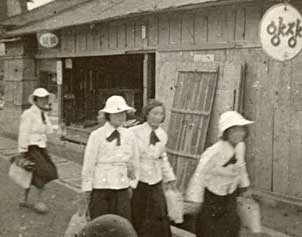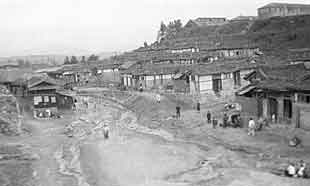 |
||||
 |
||||
Shitsville - Chris Sarno Memoir |
||||
| When his R&R was over, Sarno went back to the drudgery of AT-7. He had wonderful memories that he would never
forget of his five-day stay in Japan. "Kyoto was like Shangri-La to me," he recalled. He held on to his memories
of it in a tangible way when he got back to the company by flying a white and blue silk flag from the R&R Hotel on
his tank. Unfortunately, the lieutenant made him take it down in a few days. "It was a weird, oriental thing,"
Sarno said. "The big calligraphy symbol on it meant fresh water." Yoshiko hoped that he would come back to Japan
for a second R&R, but Sarno had little hope for that possibility. "You could only go on R&R every six months," he
said, "and I would be going home in two months."
The "umpires" were made up of Army brass who watched the exercises intently to see how the team adjusted to certain problems facing them. "It was a 24/7 war," Sarno recalled, and it was not without its unexpected events. One night, for instance, a Reconnaissance unit discovered four rice paddy queens doing business in the weeds with GIís. They were flushed out from an area right in the middle of the combat exercises. "I didnít get laid by those US Army area rice-paddy bimbos," Sarno said. "After my R&R in Japan, I became very particular where I dipped my wick." Another night, AT-7 and the 2/7 Marines tied in together and were hit by the aggressors. "I was lead tank," Sarno recalled. "Prior to going in to one area, I had talked to the grunt sergeant and told him to have a runner alert me if we needed to pull back. I didnít want to get overrun and captured in the exercise. Not long after, the whole area was alive with small arms fire [blanks]. When I ran towards the grunt line of defense, I found no Marines at all. They had withdrawn without letting us in on the movement. I was still snooping and pooping to link up with grunts when an aggressor leveled his M-1 at me for capture. I threw a rock at him and made it back to my tank. We withdrew, shooting up a lot of boxes of blank ammo as now the aggressors were all over the tank and 2/7 Marine grunts." AT-7 and the 2/7 Marines had a USMC critique as to why all of them got overrun and captured. "I was pissed at the fact that no grunt runner told us to shag ass," Sarno said. "We were eating rations with 2/7 grunts when I rushed the grunt sergeant who had given his word to tell us if they were withdrawing so we couldnít get overrun. He screwed us but good. I went face to face with him and we tangled assholes before a bunch jumped in to break it up. I just wanted his men to see how he bayoneted my crew without passing the word that the aggressors broke through. A lot of these non-combatant Marines lacked battlefield smarts. After I chewed him out, I doubt if that grunt sergeant ever again forsook Marines who depended on him." |
||||
|
||||
 |
 After he
returned to Korea, the tankers in AT-7 were trucked to the central front to "Nightmare Range." Sarno recalled that
the area was very rocky with granite ledges jutting up all over the topography, but it was also very verdant with
scrub pines. "Nightmare Range was a US Army-operated live fire range with a lot of natural obstructions," he said.
"There was daytime training, as well as night military problems to executive versus Ďaggressorí forces. My
lieutenant had me as lead tank on assault one evening. We were attacking a position, using the bow and turret
machine guns. I ordered the two gunners to shoot the hell out of whatever looked like a target. The driver had a
tough time buttoned up, as boulders were strewn throughout this venue. It was follow the leader, and we were
literally shooting up the place with live .30 caliber ammo. My coaxial mounted .30 in the turret started to
misfire, and the loader couldnít correct the mechanism to fire the turretís .30 caliber machine gun. I got pissed
at his ineptness and worked the mechanism manually as the gunner fired away. The gunner was too timid, so I showed
the loader how to use the mechanism and I got in the gunnerís seat and shot up the range. We used up all the
machine gun ammo. It was my first time back gunning again. The lieutenant was one happy officer as the umpires
liked to see a lot of return fire from the tanks. He relied on my combat savvy as I was the only tanker in AT-7
with some."
After he
returned to Korea, the tankers in AT-7 were trucked to the central front to "Nightmare Range." Sarno recalled that
the area was very rocky with granite ledges jutting up all over the topography, but it was also very verdant with
scrub pines. "Nightmare Range was a US Army-operated live fire range with a lot of natural obstructions," he said.
"There was daytime training, as well as night military problems to executive versus Ďaggressorí forces. My
lieutenant had me as lead tank on assault one evening. We were attacking a position, using the bow and turret
machine guns. I ordered the two gunners to shoot the hell out of whatever looked like a target. The driver had a
tough time buttoned up, as boulders were strewn throughout this venue. It was follow the leader, and we were
literally shooting up the place with live .30 caliber ammo. My coaxial mounted .30 in the turret started to
misfire, and the loader couldnít correct the mechanism to fire the turretís .30 caliber machine gun. I got pissed
at his ineptness and worked the mechanism manually as the gunner fired away. The gunner was too timid, so I showed
the loader how to use the mechanism and I got in the gunnerís seat and shot up the range. We used up all the
machine gun ammo. It was my first time back gunning again. The lieutenant was one happy officer as the umpires
liked to see a lot of return fire from the tanks. He relied on my combat savvy as I was the only tanker in AT-7
with some."